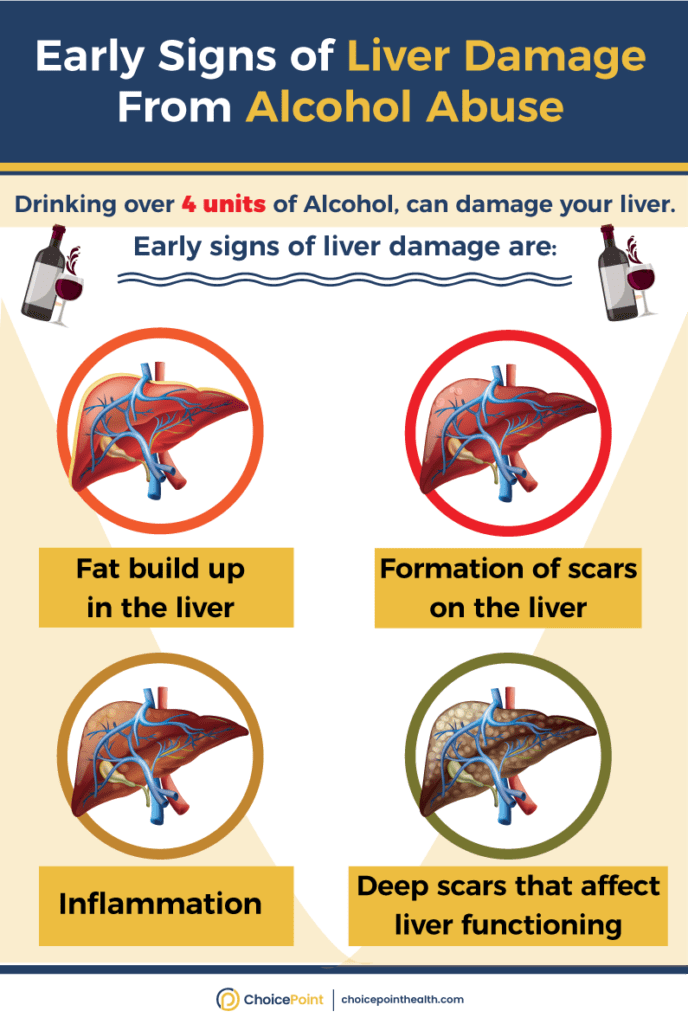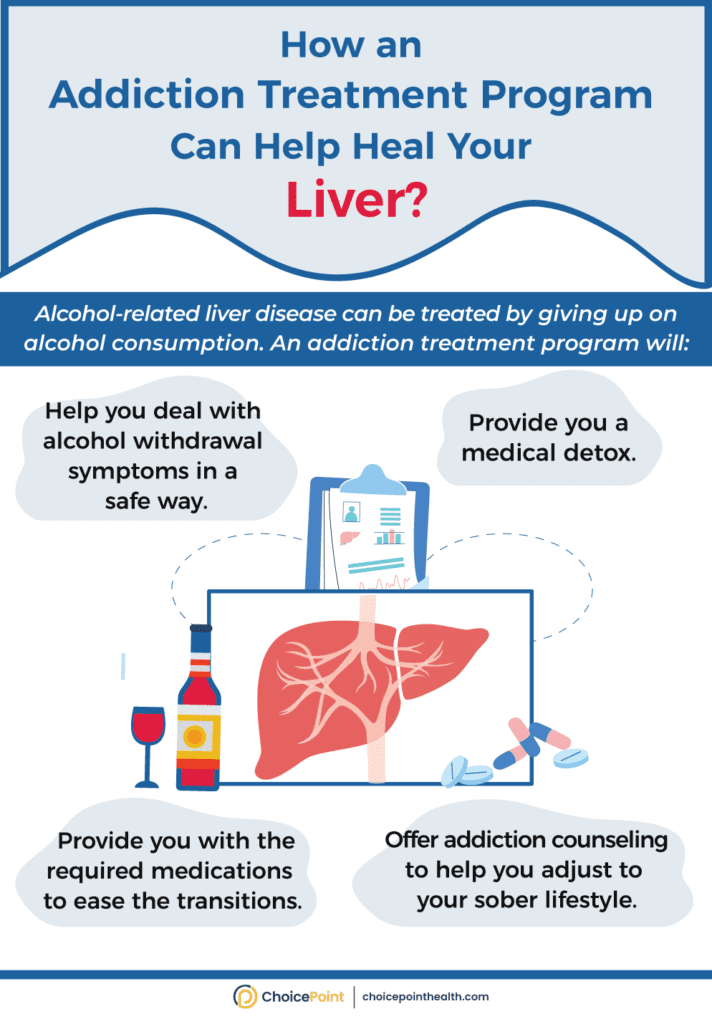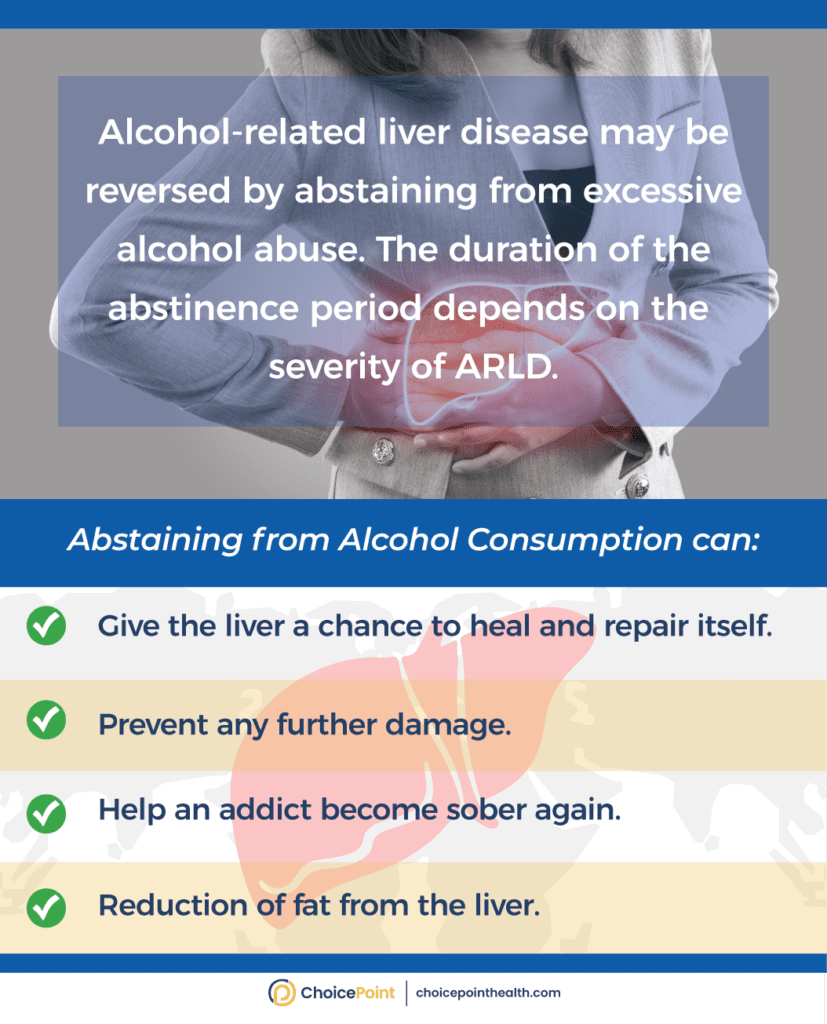Did you know? It is reported that alcohol abuse is one of the leading causes of liver inflammation in the US. In 2015, 20% of the liver transplants were performed due to the damage done by alcohol. Therefore, drinking alcohol more than what the liver can process can damage the liver and cause alcohol-related liver diseases. Read ahead and find out:
- How does the body process alcohol?
- How much alcohol is too much?
- Early signs of liver damage from alcohol
- How to heal your liver after alcohol abuse!
- Treatment for alcohol abuse and addiction
Table of Contents
Health Risks of Chronic Alcohol Abuse on Your Liver
The liver is an important organ of the body, and it performs over 500 functions. It filters out blood toxins, stores energy, and makes hormones and proteins that regulate cholesterol and blood sugar levels.
The liver is also responsible for filtering out alcohol, and when it does, some cells die in the process each time. However, it can develop new cells, but with prolonged use of alcohol, the ability to flush out and regenerate new cells may deteriorate. Though the liver is extremely tough and is capable of self-regeneration, excessive consumption of alcohol can cause swollen liver, which, if not treated in time, can lead to liver failure. Therefore, heavy drinkers are at a high risk of developing the alcohol-related liver disease (ARLD) at some point in their life.
Let’s learn about the three stages of Alcohol-related liver disease:
Stage 1: Alcoholic Fatty Liver Disease
The first stage of ARLD is the alcoholic fatty liver. A fatty liver is caused by excessive drinking because a large amount of alcohol in the body can cause fat to build up. It is reversible if caught in time, and the individual stops drinking.
Stage 2: Acute Alcoholic Hepatitis
It is a very serious condition resulting from binge or excessive drinking of alcohol. Alcohol abuse can form scars, cause swelling in the liver, and lead to liver failure or even death. However, it can also be reversed with proper treatment and a user stop abusing alcohol by seeking timely alcohol addiction treatment.
Stage 3: Alcoholic Cirrhosis
Alcoholic Cirrhosis affects around 15% of people who are excessive drinkers. It is considered the most severe stage of ARLD as it causes deep scarring on the liver, and cells in the affected area do not function as efficiently as before. The damage done by alcohol at this stage can only be reversed if the person quits drinking for the rest of their life.
After learning, if you are looking for the answer to how long to abstain from alcohol to repair the liver? We recommend seeking urgent care from an addiction specialist near you who can help you change your drinking behavior and cravings through a personalized alcohol addiction treatment program that also involves MAT-based addiction therapies.

Signs Your Liver Is Struggling
How Much Alcohol Does It Take to Damage Your Liver? – 5 Warning Signs
How much alcohol is too much? The answer to this is that even though there is no alcoholic beverage that is safe for the liver but if you consume a restricted amount of alcohol, there could be no risk posed to the health of your liver. The following amount of alcohol intake is generally considered safe to consume:
- Men: Not more than two drinks per day
- Women: Not more than one drink per day
It is strongly recommended to stop drinking and seek addiction treatment if you notice these five early signs of Alcoholism:
- Increased tolerance for alcohol
- Experience withdrawal symptoms upon not drinking alcohol
- Being irritable, stressed, isolated, and displaying extreme mood swings.
- Short term memory loss and experience blackouts regularly
- Any indication that your liver is not functioning properly
It is rightly said that prevention is better than cure. So if you think you or someone you love are abusing alcohol, stop and reflect on your life before alcohol damage your liver.
Early Signs of Liver Damage From Alcohol
- Fatigue
- Constant abdominal pain and slight swelling in the body
- Yellow tinge in eyes and face
- Sudden weight loss
- Traces of blood in stool and vomit
- Dark urine
Don’t ignore these early signs of addiction and get the help you or a loved one deserve! Want to find out the severity of your alcohol dependence? Take this 5 min free addiction assessment test and find out now.

Journey Towards Sobriety!
How to Heal Your Liver After Alcohol Abuse – Seek Addiction Treatment
Each year, between 15% and 30% of heavy drinkers are diagnosed with cirrhosis. Although the vast majority of people with cirrhosis survive if they seek treatment for their addiction. Despite this, alcohol is responsible for 40 to 90 percent of the 26,000 cirrhosis fatalities per year.
Now suppose you think that you have started showing the signs of alcohol abuse, and that can result in damage liver. In that case, you must not wait till the time your liver displays signs of Alcohol-related liver disease; visit an alcohol rehab near you and get the addiction treatment right away. The ultimate goal of addiction treatment is to:
- provide sustainable recovery, which can also help not to affect the health of your liver.
- eliminate the cravings for alcohol completely.
- make sure a safe withdrawal from alcohol and enable an addiction-free life
Here are some ways seeking addiction treatment can help to heal your liver after alcohol abuse:
1. Outpatient Medical Detox
People who develop the alcohol-related liver disease can reverse some of its negative effects by completely abstaining from drinking alcohol, especially when the liver disease is in its early stages. Alcohol dependency can make it hard for alcoholics to completely quit without a supervised alcohol withdrawal.
Symptoms of Alcohol Withdrawal
The symptoms may vary from person to person, depending on the severity and duration of alcohol symptoms. The most commonly observed symptoms of alcohol withdrawal are:
- Sweating
- High heart rate and blood pressure
- Restlessness and insomnia
- Body tremors
- Seizures
- Confusion and disorientation
What Happens During a Medical Detox for Alcohol Abuse?
Alcohol withdrawal can be life-threatening. Therefore, if a person drinks more than the recommended amount of alcohol in a day, they must seek the help of a professional addiction specialist. During a medical detox:
- The patient will be guided and supervised at each step by a medical professional
- FDA- approved Medications such as Benzodiazepines and Naltrexone may be prescribed
- The vitals will be monitored regularly to reduce the risk of any complications such as seizures.
- An addiction specialist will carefully manage any withdrawal symptoms.
Detox is a great way to restore the health of the liver. Here are some signs your liver is healing from alcohol and detox was successful:
- More energy and fewer toxins in the body
- Reduces inflammation in the liver
- A healthy gut and better metabolism
Medical detox is performed in an addiction facility to ensure a safe withdrawal. If you are looking for alcohol detox centers in NJ, schedule an with our doctors at ChoicePoint so they can help you eliminate your alcohol cravings which can also improve the overall health of your liver!

How to Heal Your Liver After Alcohol Abuse?
2. Outpatient Alcohol Addiction Rehab
Outpatient alcohol rehab is a popular and effective method of treating alcohol use disorder (AUD). Being in an Outpatient rehab lets people seek addiction treatment for their alcohol addiction without interfering with their regular duties such as work, education, and family obligations.
Benefits of choosing an outpatient addiction treatment program to heal your liver after alcohol abuse are:
- A flexible schedule lets the patient control when they see the doctor.
- It is less time-consuming and more cost-effective than an inpatient addiction treatment plan.
- Provides ongoing 24/7 support to patients even after completing a successful rehab.
- You don’t have to stay in the facility overnight.
3. Addiction Therapies
Counseling sessions help build a relationship between therapist and patient. These sessions are essential for an addict because they help them understand their cravings and triggers and how to stop them. Addiction counseling aims to:
- Motivate people about how to curb their alcohol cravings and lead a sober life
- Change the negative behaviors that lead to excessive drinking
- To change an individual’s perceptions and improve the overall physical and mental health.
Most addiction counseling also includes family and friends, so the addict knows they are not in this alone. Some types of addiction therapies are:
- Cognitive-Behavioral Therapy Program
- Dialectical Behavior Therapy Program
- Group Therapy Program
- Individual Therapy Program
- Family Therapy Program
Alcohol can often lead to developing mental health disorders like anxiety, stress, and mental loss. If you or a loved one is looking for a dual diagnosis treatment center in NJ that offers treatment for patients who suffer from a co-occurring disorder, contact ChoicePoint at 844.445.2563.
4. Medication-Assisted Treatment (MAT) Program
Doctors offer Medication-Assisted Treatment (MAT) during Outpatient and Intensive outpatient addiction treatment. It may involve the use of medications along with counseling sessions to treat substance abuse. Medications (Suboxone, Subutex) can control the cravings, and counseling sessions (Cognitive Behavioral Therapy) can help change the perspective.
Benefits of the MAT Program
MAT program helps people struggling with opioid or alcohol addiction. Here is why most people find MAT programs most helpful:
- Treats multiple aspects of addiction in a person
- FDA-approved medications along with addiction counseling make a recovery long-lasting
- Improves physical and psychological stability and reduces the chances of relapse.
ChoicePoint is an addiction treatment facility that provides FDA- approved MAT-based substance abuse treatment, depending on the severity of your condition.

Journey Towards Sobriety!
Signs Your Liver Is Healing From Alcohol Abuse
As it has been established that excess amounts of alcohol can deteriorate liver health and affect the functioning of the liver. Once a person begins to control the amount of alcohol intake, they will start noticing signs of liver healing. Some of the most prominent signs your liver is healing from alcohol abuse are:
- Regulation of amino-acid
- Balance glucose levels
- Eliminate toxins and bacteria from the bloodstream
- Convery glucose into glycogen

What Happens When You Abstain From Alcohol?
Liver and Alcohol – Role of ChoicePoint As An Addiction Treatment Center
It is important to watch what you put into your body. As it is not an unknown fact that excessive alcohol can destroy your body. Therefore, it is better to stop and seek help before any permanent damage is done. Suppose you notice that you are displaying signs of alcoholic fatty liver disease and can’t manage alcohol withdrawal on your own. It is time to seek professional help on how to heal your liver after alcohol abuse.
The best way to heal your liver after alcohol abuse is to address the underlying issue of excessive drinking. ChoicePoint is an Addiction treatment center that provides a holistic approach by using MAT programs to abstain you from alcohol use disorder, and manage your cravings so that you can start living a sober life. So, seek help before it is too late.
Here is how our DEA certified addiction specialists at ChoicePoint can help you heal your liver after alcohol abuse:
ChoicePoint in Fair Lawn, New Jersey is a co-occurring addiction treatment center that offers virtual and in-person addiction treatment programs. To schedule an appointment with our addiction specialist, simply call us at 844.445.2563 or fill out this online form.
Medical Disclaimer:
ChoicePoint aims to improve the quality of life for people struggling with substance use disorder and mental health issues. Our team of licensed medical professionals research, edit and review the content before publishing. However, this information is not intended to be a substitute for professional medical advice, diagnosis, or treatment. For medical advice please consult your physicians or ChoicePoint's qualified staff.









Review How to Heal Your Liver After Alcohol Abuse.